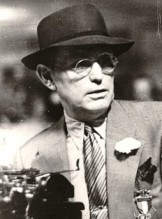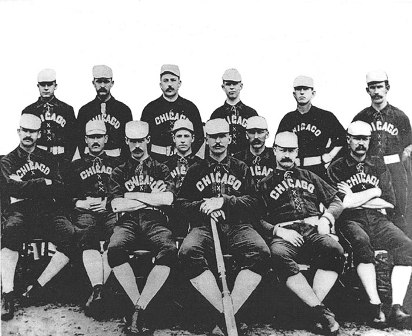In 1912 Horace Fogel, president and owner of the Philadelphia Phillies and umpire William Thomas “Bill” Brennan were at the center of baseball’s biggest controversy: Fogel accused Brennan and others with favoring the pennant winning New York Giants.
Fogel first suggested that St. Louis manager Roger Bresnahan was “pulling for” New York after the Giants won two of three games from the sixth place Cardinals in August.
Less than a month later Fogel would turn his attention to the umpires, and National League President Thomas Lynch. Fogel was not a fan of the league president to begin with; the previous December The New York Times said that Fogel had been coerced by Cincinnati Reds owner August Herrmann into supporting Lynch’s reelection at the league meeting in New York:
“It was reported about the Waldorf yesterday that… (Chicago Cubs President Charles) Murphy and Fogel would not vote against Mr. Lynch because President Herrmann had in his possession a letter which was sent to him by mistake from Fogel, when it should have been sent to Murphy. Mr. Fogel, it seems, put Mr. Murphy’s letter in the envelope addressed to Mr. Herrmann. It is said to contain something important about the relations of the Philadelphia and Chicago clubs.”
On September 7 Fogel wrote a letter to Lynch attacking the league’s umpires in general and Brennan specifically, and according to The Philadelphia Inquirer “hinting that Lynch had some influence in their poor officiating.”
A week later an article, said to be authored by Fogel, appeared in The Chicago Evening Post that repeated the charges made in the letter to Lynch. Fogel also sent Herrmann a telegram telling the Reds owner he felt the National League pennant race was “crooked.”
Brennan was the first umpire to respond. He sent a letter to the National Baseball Commission on September 30 demanding an apology from Fogel for impugning “the impartiality of National League umpires.”
Fogel repeated his accusations again in letters sent the following week to the seven other National League team presidents, and promised to “make startling disclosures.”
On October 17 The Associated Press said his counterparts voted to “formally draw up charges against President Fogel of the Philadelphia club for his remarks reflecting on the integrity of National League umpires.”
Brennan told reporters that he would be filing a libel suit against the Phillies owner.
A hearing was scheduled for November 26. President Lynch said:
“If the charges can be proved, then the umpires in question should be blacklisted and the president of the league should step down in disgrace. If the charges are not true, some step should be taken to see that this man no longer represents a club in the National League.”
Fogel responded:
“I probably will begin an action for criminal libel against (Lynch) at an early date. I have retained Hughey Jennings (the Tiger manager was also an attorney in Scranton, PA) as one of my lawyers, and I intend to have several of the best men in Philadelphia.”
As the members of the National League executive committee gathered at New York’s Waldorf Astoria Hotel to determine whether he should be expelled from the league, the Philadelphia magnate attempted and end run; he announced that he had relinquished day-to-day operations of the team VP Albert D. Wiler. By doing so Fogel’s attorney (Jennings did not represent him at the hearing) claimed the league “had no right to try Fogel, as he was no longer an officer of the National League.”
The proceedings went forward with Fogel facing seven specific charges:
-
The accusation against Bresnahan
-
An allegation that he told reporters on September 5 that the pennant race was fixed.
-
The letter to Lynch attacking the umpires and hinting that Lynch was influencing their decisions.
-
The article in The Chicago Evening Post repeating the charges made in the letter to Lynch.
-
The telegram to Herrmann.
-
The letters to the other seven club presidents.
-
The allegations Fogel made both publicly and privately, about Brennan.
The Philadelphia Inquirer said:
“Fogel denied charges one and two and maintains that charge three was a privileged letter and not for publication. While he did not actually deny writing the article that appeared in The Chicago Evening Post, he declared that the statement was not authorized and said it must have been misinterpreted. He said he simply wanted to see reforms made and was not attacking anybody or anything in connection with baseball. He denied outright the charges that he had said anything derogatory to umpire Brennan and claims privilege of the letters and telegrams.”
Besides Fogel, three New York reporters testified that Fogel made the statements attributed to him in the press, while “Fogel had a flock of Philadelphia scribes who politely but forcibly insisted the New York men were romancing.”
After a six-hour hearing over two days the committee unanimously found Fogel guilty of five of the charges (the letter to Lynch and telegram to Herrmann were deemed privileged and those counts were dismissed). The League ruled that Fogel was “forever excluded from participation,” in the National League.
The Inquirer said:
“Mr. Fogel had no sooner read the decision than he countered it with a defiant statement. Before the meetings began he had expected such a decision, he declared. ‘The jury was packed against us, ‘he asserted, and he practically told the magnates who had expelled him from their councils that he would pay no attention to their findings.”
Fogel did have his defenders, author, and Heart Newspaper correspondent, Damon Runyon said:
“As we understand the matter, Horace Fogel has been found guilty of conversation in the first degree.”
Fogel’s defiance and threats against Lynch, the league, and the magnates who had ousted him. The Chicago Evening Post reported in February of 1913 that Fogel “has accepted an offer of $10,000 to write a series of articles in which he will later attempt to prove that baseball is a crooked game.”
Instead he launched a magazine, rumored to be funded by Charles Phelps Taft, brother of the President, who had bankrolled Fogel’s initial purchase of the Phillies. “Baseball Weekly” began publication in March, 1913, and over the course of the next several months set out to discredit the game, focusing on two points, which had been and would continue to be the major criticisms of organized baseball.
Fogel railed against the reserve clause, calling it “virtual baseball slavery,” and argued that organized baseball violated the Sherman Antitrust Act, earning him the June 1913 cover of rival “Baseball Magazine,” and the title, “The Man who is Trying to Wreck Baseball.”
Fogel would remain a baseball gadfly for the next decade. Took ill in the early 20s and died in Philadelphia in 1928.
His interest in the team was purchased by a group led by William H. Locke, former secretary of the Pittsburgh Pirates. When Locke died in October of 1913, his uncle, former New York Police Commissioner William Baker took control of the Phillies, leading the team until his death in 1930.
Brennan announced after Fogel was banned that he would drop his proposed $10,000 libel suit, telling The Associated Press:
“I am satisfied, I immediately demanded a hearing before the National League heads and Fogel’s trial was brought about as a result of my demands.”
Later this week; an allegation that Fogel was a patsy, and umpire Brennan’s other battle in the City of Brotherly Love.






11 Responses to “The National League versus Horace Fogel”